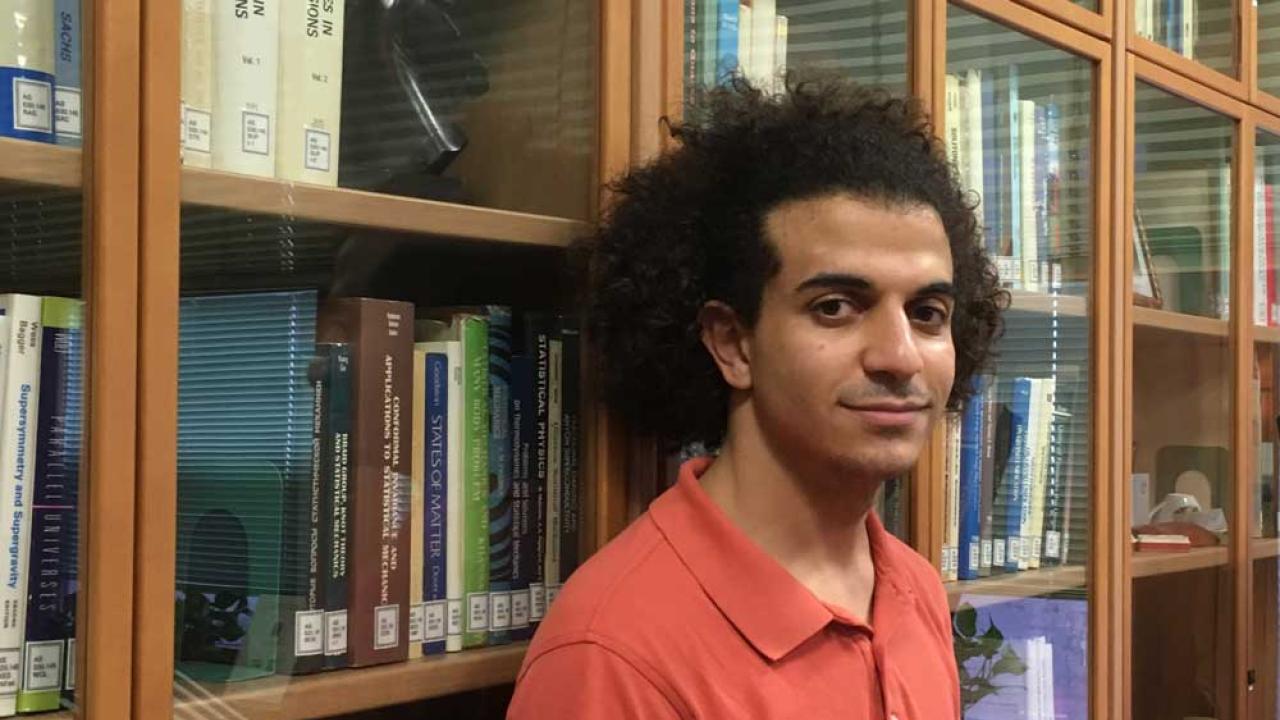
“I want to be a number theorist,” says ICTP Diploma student in mathematics Asem Abdelraouf, “and while it has practical applications, I consider it an art, like music or painting. My interests are mainly theoretical.” Abdelraouf, who grew up in Baltim, Egypt, has been in pursuit of this art since high school, focusing on fundamental mathematics research for its beauty and intrinsic value.
At ICTP, Abdelraouf has been able to dive into studying elliptic curves, doing his Diploma thesis with ICTP mathematician Fernando Villegas. “Here, whenever I find something beautiful or intriguing, like a pattern or a neat argument, I can share it with my colleagues,” Abdelraouf says. “But I think I can explain it to anyone who is interested in knowing.” Abdelraouf very much enjoyed his time spent studying at ICTP. “On a hill next to the sea – it’s a great place to study because it’s quiet and peaceful. The people are great, all really nice and helpful,” he says. “I think of ICTP like a family and it’s going to be very difficult to leave here.”
Abdelraouf's path turned towards studying mathematics in high school, when he was curious about assumptions made during calculus class, leaving with many questions. “I have always been interested in math, but it wasn’t until in high school that I decided to explore more of mathematics outside of school. Being from a small town and not knowing how to learn more math, I went onto [the book review website] Goodreads and typed math in the search,” remembers Abdelraouf. “The first book that came up, I got it and read it from front to back, doing everything it mentioned. I learned a lot.” That book was Calculus by James Stewart, and it spurred him to keep exploring and eventually pursue mathematics full time. “It’s a fabulous book,” Abdelraouf says.
Choosing to study mathematics caused some controversy when Abdelraouf was in university: “In Egypt people go into medicine or engineering – anything else, you’re a failure,” explains Abdelraouf. Top students in the country qualify for places in universities, and they are expected to study engineering or medicine, as Abdelraouf’s parents and siblings did. “My family is now quite proud of me, but initially they did not support my decision to switch from studying engineering to studying mathematics.”
The switch was a rare move for university students, says Abdelraouf, who transferred from Kafr Elsheikh University to Ain Shams University to concentrate on mathematics. A university outlet wrote an article on Abdelraouf’s choice, which attracted the attention of some other students considering similar moves. “I got some reputation because of the switch, and other students started asking for support and advice.”
With luck, choosing to study science will become a more common choice for students in the near future. The country of Egypt has recently raised the percentage it invests in research and development to 1% of GDP, moving towards valuing basic research as a driver of national growth. But while there are many well-established universities in Egypt, they are not often research-focused, with few students and faculty spending much of their time on research. Of the scientists that do spend some of their time on research, 43% are women, making Egypt a leading country in the region in approaching gender parity, although the balance in the physical sciences lags behind significantly. Despite these systematic issues, publication rates from Egyptian scientists have seen strong growth in the last decade.
Abdelraouf hopes that continuing his education will let him support other students and mathematicians even more. That wish, and his love of the art of mathematics, is taking Abdelraouf to Paris for a master's degree programme at Diderot Université. “Ideally, I would like to get a PhD and then get a postdoctoral position or two,” he says, “and in the process teach people, produce original research, and give back to the mathematics community and hopefully the world.”
---- Kelsey Calhoun
















